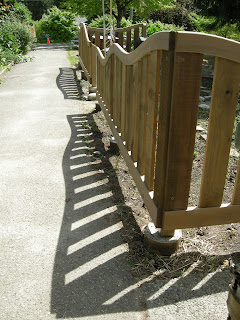 |
| 3 piece gate |
Since April we've been prepping the school garden area. All that was needed was a new fence to replace the old one which was born eighteen years ago.
We've looked around on the internet but only found the same curve being used repetitively, or flipping and flopping the curve alternatively.
We wanted a fence that is unique.
A fence to run a hand along.
Not steeple topped pickets.
Not flat topped boards.
A fence that would not restrict the view of a person, young or old, ... too short to see over.
Eight panels: Two days per panel to build.
 |
| Sun Dial time |
 | ||
| ~~~~~~~~~~~~~ ~~~~~~~~~~~~~~~~~~~~ ~~~~~~~~~~~~~ |
 |
| Vancouver Waldorf School |
Doing:
2 X 6 X 8 cedar board; ripped into 1/4" strips (16pcs); glued back together in groups of eight to make one 4" wide top rail.
Titebond III Waterproof (EXTERIOR)
Shake well before gluing
**************************************************
Finishing: Valhalla Wood Preservatives
NON-TOXIC WOOD STAIN
Friendly to Plants, Animals
and PeopleThe natural substances penetrate the wood fibres, permanently modifying the wood structure. Independent laboratory testing confirms that LifeTime® non-toxic wood stain creates no harmful residue in soils and water. LifeTime® is friendly to plants, animals and people and can be used in direct contact with garden soil.
EASY TO USE
Just mix with water and applyA powder concentrate available in 4.5 litre/1 imp gallon and 22 litre/5 imp gallon packages. Just mix with water.
NO MAINTENANCE
Never scrape or re-stain again Does not fade or wearIts that simple. LifeTime® can be stored indefinitely in powder or liquid form. If you only mix what you need, you will never have large amounts of LifeTime® solution left over.
FOR ALL OUTDOOR WOOD
LifeTime® proven formula has been treating wood for over 60 years!
The suggested retail price for 4.5 litre/1 imp gallon package of concentrate is $18.95 CAD and $85.75 CAD for a 22 litre/ 5 imp gallon package. LifeTime® covers 150-200 square feet and 750-1,000 square feet, respectively.
Testimonials




















